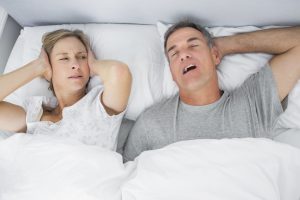 With busy schedules and daily stress, an occasional sleepless night that leads to a sleepy day happens to nearly everyone occasionally. However, if you’re feeling fatigued regularly during the day, then you may not be getting quality sleep during your nights. If this is the case, then you may have sleep apnea, a chronic medical condition that pauses breathing while you sleep. For sleep apnea treatment in Owings Mills, Dr. Mattson can prescribe a comfortable oral appliance that you’ll wear nightly to promote easier breathing. Read on to learn more about symptoms, side effects and treatment of sleep apnea.
With busy schedules and daily stress, an occasional sleepless night that leads to a sleepy day happens to nearly everyone occasionally. However, if you’re feeling fatigued regularly during the day, then you may not be getting quality sleep during your nights. If this is the case, then you may have sleep apnea, a chronic medical condition that pauses breathing while you sleep. For sleep apnea treatment in Owings Mills, Dr. Mattson can prescribe a comfortable oral appliance that you’ll wear nightly to promote easier breathing. Read on to learn more about symptoms, side effects and treatment of sleep apnea.
How Does Sleep Apnea Happen?
There are two types of sleep apnea: central sleep apnea, which is neurologically based, and obstructive sleep apnea (OSA), which happens when throat tissue relaxes during sleep. Obstructive sleep apnea is by far the more common condition. With OSA, throat tissue and your tongue relax while you sleep and can fall back to block part of your airway.
What are the Symptoms of Sleep Apnea?
With tissue blocking your airway, sleep apnea’s most common symptom is heard—loud snoring. This happens because the little air you are able to breathe vibrates the relaxed tissue.
Other common symptoms of OSA are:
- A sore throat or dry mouth in the morning
- Needing to urinate often during the night
- Morning headaches
- Daytime sleepiness
- Irritability
- Trouble concentrating and remembering
In addition, the daytime sleepiness that OSA can lead to has also been connected to driving accidents.
What are the Side Effects of Sleep Apnea?
In addition to the increased risk of driving while tired, there are other side effects associated with sleep apnea. Some of these include hypertension, stroke, heart attack, type 2 diabetes and depression.
Hypertension, or high blood pressure, is of particular concern. Because you can’t breathe well, the oxygen level in your blood drops. To compensate, your heart must work harder in order to pump more blood and more oxygen to vital organs. Unfortunately, the resulting high blood pressure is not restricted to nighttime hours, but tends to continue throughout the day.
How is Sleep Apnea Treated?
For sleep apnea treatment in 21117, Dr. Mattson can prescribe an oral appliance. She uses three different oral appliances: Silent Night by Glidewell, the EMA sleep appliance, and the TAP III. After your diagnosis, Dr. Mattson will be able to determine the one that best suits your needs. Any one of these helps keep your airway open so you can breathe easier and sleep better.
Call Our Office Today and Sleep Well at Night
If you or anyone else in the family is experiencing any of the above-mentioned symptoms, then a sleep study to diagnose sleep apnea is recommended. Call Diamond Dental of Owings Mills to schedule an appointment.
